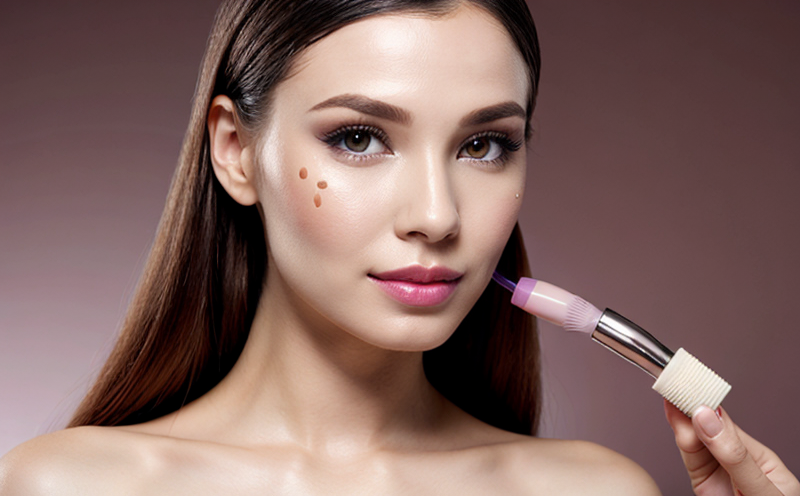In Vitro Tight Junction Integrity Testing in Cosmetics
In vitro methods have revolutionized the field of cosmetic safety testing by offering a more humane and efficient alternative to traditional animal testing. One such method is the assessment of tight junction integrity, which plays a crucial role in determining the permeability and barrier properties of cosmetic formulations. The tight junctions are protein structures that form an almost impermeable barrier between adjacent cells within tissues like skin and mucosa.
Understanding tight junction integrity is vital for ensuring the safety of cosmetics as it directly influences how substances can penetrate into or out of the body. This test evaluates whether a cosmetic formulation maintains its structural integrity when exposed to external factors such as solvents, preservatives, or other ingredients that may alter its barrier properties.
The in vitro tight junction integrity test is conducted using human cell lines derived from various tissues relevant to cosmetics, including skin and mucosa. These cells are cultured under controlled conditions until they form a monolayer that mimics the natural epithelial barrier found in these tissues. The integrity of this monolayer can then be assessed by measuring its permeability.
The standard method for evaluating tight junction integrity involves exposing the cell layer to various test compounds and monitoring their passage through the membrane. This is typically done using a technique called transepithelial electrical resistance (TEER) measurement, which quantifies the barrier function of the tissue model. Higher TEER values indicate better tight junction integrity.
Another critical parameter in this testing process is paracellular flux, which refers to the movement of molecules between cells via intercellular spaces. By analyzing changes in paracellular permeability, researchers can gain insights into how well the cosmetic formulation maintains its protective barrier properties.
International standards such as ISO 10993-4 and ASTM F875 provide guidelines for conducting these types of tests. Compliance with these standards ensures that the results are reliable and comparable across different laboratories, enhancing confidence in the test outcomes.
- ISO 10993-4: This international standard specifies the general principles and requirements for the selection, validation, and implementation of biological evaluation procedures for medical devices. It provides a framework within which organizations can develop comprehensive plans to meet regulatory requirements.
- ASTM F875: Developed by ASTM International, this standard offers specific protocols for assessing permeability across in vitro skin models. It helps ensure consistency and accuracy in the evaluation of transdermal delivery systems.
The results from these tests are crucial not only for regulatory compliance but also for product development. They provide valuable information on potential risks associated with certain ingredients or formulations, allowing manufacturers to make informed decisions about ingredient selection and formulation adjustments.
By leveraging in vitro tight junction integrity testing, companies can accelerate the development of safer cosmetic products while minimizing unnecessary animal testing. This approach aligns with global trends towards more ethical and sustainable practices in product development.
Eurolab Advantages
At Eurolab, we pride ourselves on providing cutting-edge solutions for cosmetic safety testing. Our state-of-the-art facilities are equipped with the latest technology and methodologies to ensure accurate and reliable results. With a team of highly skilled scientists and engineers, we offer comprehensive services tailored to meet your specific needs.
- Comprehensive Services: We provide a wide range of in vitro tests that cover various aspects of cosmetic safety, including irritation potential, sensitization risk, and biocompatibility.
- Expertise and Experience: Our team consists of experts with extensive experience in the field of cosmetics testing. They stay updated with the latest research and regulatory changes to ensure compliance with international standards.
- Prompt Turnaround Times: We understand that time is critical in product development cycles. That's why we strive to deliver results quickly without compromising on quality.
- Regulatory Compliance: All our tests are conducted according to internationally recognized standards, ensuring that your products meet the necessary requirements for safe and effective use.
We take pride in maintaining high ethical standards by offering alternatives to animal testing whenever possible. This commitment reflects our dedication to promoting innovation while adhering to strict quality control measures.
Quality and Reliability Assurance
EuroLab is committed to delivering consistent, high-quality results that exceed industry expectations. Our robust quality management systems (QMS) are designed to ensure accuracy, reproducibility, and reliability in all our test methods.
We employ stringent quality control measures throughout the entire testing process, from sample preparation to final analysis. This includes rigorous calibration of instruments, regular validation of protocols, and continuous monitoring of environmental conditions that could affect the outcome of tests.
Our highly trained staff adheres strictly to established guidelines and best practices set forth by recognized bodies such as ISO 17025 for laboratory accreditation and Good Laboratory Practices (GLP). These stringent controls help us maintain a high level of confidence in our results, ensuring they are both accurate and actionable.
Furthermore, we have invested heavily in advanced equipment and technologies to support our commitment to excellence. Our state-of-the-art laboratories feature automated systems that minimize human error while enhancing precision and efficiency.
International Acceptance and Recognition
- ISO/IEC 17025: Our facilities hold international accreditation under this standard, which ensures that our testing processes meet the highest quality requirements.
- GLP Compliance: We adhere to Good Laboratory Practice standards set by regulatory authorities worldwide, ensuring consistent and reliable data generation.
- OECD Guidelines: Our tests comply with Organisation for Economic Co-operation and Development (OECD) guidelines, which are widely accepted across Europe and beyond.
EuroLab has been recognized by major regulatory bodies like the European Union, United States Food and Drug Administration (FDA), and Health Canada. This recognition underscores our commitment to providing accurate, reliable data that meets global standards of excellence.





